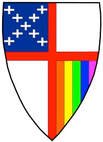|
The psalmist this week remind us not to fear.
The Lord is my light and my salvation; whom then shall I fear? * the Lord is the strength of my life; of whom then shall I be afraid? This is a common theme in the Bible: “Do not be afraid.” Fear may protect us as an instinctual red flag, which is important, but most of the time it is unhelpful. It hampers us from exploring, engaging in something new, and growing. While the Hebrew scripture often includes the instruction to “fear” God, that translation is referring to “awe” (not our animal instinct of fight or flight). Awe in God is reverence, amazement, wonder: something that may include fear only because of the incomprehensibility of the World; its vastness and complexity; and the mystery of our being. Julian of Norwich says there’s nothing to be afraid of other than that Awe for God, really. So, as the self-help people tell us: “feel the fear and do it anyway.” Today in Matthew’s Gospel, Jesus calls to a few young fishermen. They pick up and leave what they are doing and immediately follow Jesus on the way. Talk about fearless! What exactly was going on, that they felt so moved, so brave?! It was a radical thing to do: leave their father’s house (His fishing - to go, as Jesus says, “to fish for men”). Many years ago I read a book called Meeting Jesus Again for the First Time. It opened my eyes to the complexity of the time in which Jesus lived and demonstrates so clearly and helpfully what we know about him as both man and Messiah. We know he and the disciples were living under Roman occupation and this meant that young men such as Jesus’ first disciples may have been fearless because they were fed up with their political environment and their social predicament. They were most likely contracted through Rome and were unfairly taxed through a percentage of the fish they caught. In our Gospel, John the Baptist has just been arrested. John had an even greater following than Jesus. He was the one who pointed his own followers to Jesus. So John the Baptist, their wild and unruly leader, who speaks truth to power has just been arrested - and Jesus has just come out of the desert after praying for forty days and being tempted by Worldly power and resisted. It is at this juncture that Jesus begins to collect his disciples. When Matthew introduces Jesus and his mission he borrows Isaiah’s words: those who lived in a land of deep darkness-- on them light has shined. The people who walked in darkness have seen a great light; The Jewish people were awaiting a Messiah. According to Isaiah he will be a light to enlighten the nations, but he will also cast the mighty from their thrones. This is where the story gets very interesting because they anticipated their savior to be a fierce leader bringing God’s righteousness and justice to the poor and the oppressed. And Jesus arrives as the savior quite counter-culturally. His response to a world of pain and injustice is to teach about peace, forgiveness and to offer healing. It is helpful not to divorce Jesus from this historical background. Many of his initial followers probably believed he was going to lead a rebellion by force. What comes next, is his ministry of teaching in the synagogues, healing, and curing people from every disease and sickness. What strikes me is how fearless these first disciples were. They heard the call to truth and radical action… and by joining with Jesus they assist in the radical action of healing and curing people. Jesus did not walk on the earth alone. He traveled with companions and was supported by the apostles, and many women and men who made his healing work possible in the world. The first followers of Jesus, that caravan, became pacifists and healers through his leadership as both man and Messiah. St. Paul did the very same. He turned from violence to peaceable leadership. Our passage from Corinthians demonstrates how easy it is for us to start turning from that counter-cultural approach to competition and quarreling. It is so apt for today with all of our polarization and taking sides. Apparently this group has splintered offering allegiance to those who baptized them forgetting they are all followers of Christ. Paul says, has “Christ been divided?” To Paul’s credit as a leader he denies any positive accountability for baptizing, saying that Christ didn’t send him to baptize but to proclaim the gospel. Paul in his wisdom, did not turn (repent) to becoming just a super nice guy. Paul had incredible conviction. Paul spoke truth to power and the truth to those who would take the power of God and try to make it their own. He says their quarrels make them “foolish” and they “perish.” The power is in our unity in Christ and Jesus’ message on earth. That is life. And life-giving. To make divisive camps within the house of God is to make an idol of the power itself. Paul speaks to a cruciform shape: the cross. It is a power that is self-emptying. This is the power that Jesus came to share. Wisdom flows from a place of self-emptying. It is sacrificial in that it requires coming out of ourselves into the perspective of another and re-integrating. It will never come from a place of force or violence or divisiveness. God’s righteousness and justice is not about putting someone under a thumb. It is about opening and opening to a place that takes a much broader perspective that leads us to greater understanding. That can be scary…How do we do this? Jesus comes out of the desert and learns that the prophet who baptized him has been arrested. The passage tells us Jesus withdraws to Galilee. The word here withdrew is the same word as flee… the word that was used for the Mother Mary and Joseph’s fleeing to Egypt). In Matthew the word is always associated with dangerous situations and fear. Jesus is afraid. Here is the very human aspect of Jesus in his historical context. What does the man Jesus do when he is afraid? He withdraws to pray. As the psalmist says, Jesus seeks God’s face. We are reminded that “behind all these [prophetic] activities was a life of constant prayer and profound contemplation.” Richard Rohr reminds us that “any idea that one could be a prophet calling for justice and social change without some experience of union with God [ie: prayer life is] unthinkable. In the Gospel of Luke, it says before he chose his disciples he spent the entire night in prayer. And in this gospel Jesus has spent forty days in the wilderness praying before he chooses his disciples. We are turning to February which is Black History month. It falls in February largely due to the birthdays of Abraham Lincoln and Frederick Douglass. These were fearless men. Or shall I say, like Jesus, they were men who felt the fear, but did it anyway. That is a place where wisdom and justice can be revealed… Our Bishop Mary Glasspool recently wrote a letter in which she framed our Christian mission as “teaching our children to love justice.” It is a great way to help our children understand Christ’s work in the world is for everyone. And the way into justice is through prayer, through the practice that God’s love is our source of power. Today we still struggle like the Corinthians. We are countercultural. Christianity continues to be misunderstood It takes conviction to say “I am Christian” at a time in our history when secularism seems the rule. As adults we may not want to be associated with fundamentalism. As children we may not want to be seen as “different” from our peers. But let us not be afraid. Instead, let us engage in awe; with exploration, and prayer knowing that we continue to be part of that timeless caravan: the heart and hands of Christ working in the world for justice. Power comes from seeking God’s face. Wisdom comes from self-emptying. Justice comes from love.
0 Comments
Leave a Reply. |
AuthorThe Rev. Heather K. Sisk Archives
July 2024
Categories |
We Would Love to Have You Visit Soon!
WE ARE ALL MADE IN THE IMAGE OF GOD |
Telephone845-635-2854
|
|
 RSS Feed
RSS Feed

